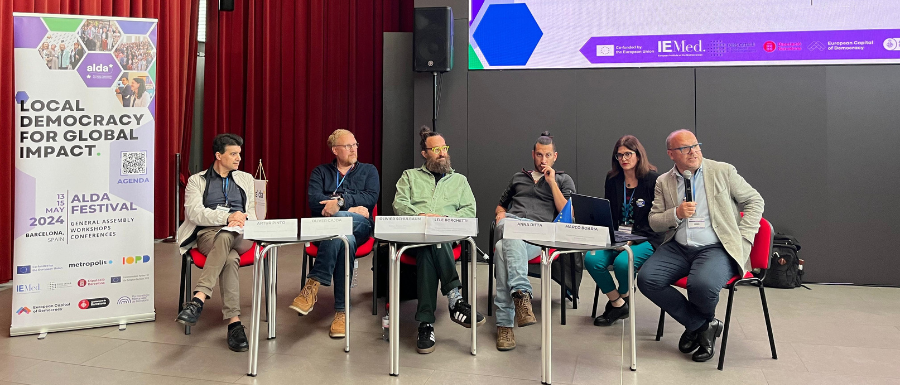On May 15, 2024, the ALDA Festival and General Assembly hosted an important workshop titled “Maximising Resources: Fundraising Strategies for Local Authorities and Civil Society Organisations.” This dynamic session aimed to equip participants with innovative fundraising strategies to strengthen local democracy and civil society organisation.
The day commenced with a warm welcome to all attendees, setting a collaborative and forward-looking tone for the workshop. The introduction outlined the goals and purpose of fundraising, emphasising its critical role in sustaining and advancing the initiatives of local authorities and civil society organisations. Highlighting the necessity for diverse fundraising strategies, the workshop’s objectives and agenda were clearly laid out, ensuring participants were prepared for an intensive learning experience.
The first session delved into traditional fundraising methods with a focus on grant writing. Anna Ditta, Head of the Development Department at ALDA, provided an overview of how to identify, apply for, and secure grants. She outlined the key steps and considerations, emphasising the importance of a well-structured approach involving dedicated human resources. The process indeed begins with scouting, which involves regularly monitoring key donors’ databases and newsletters to identify relevant funding opportunities from both EU and non-EU donors. Next is pre-selection, where potential grants are filtered based on thematic and geographical relevance, budget size, and feasibility. Strategy-making follows, involving a decision on whether to proceed with specific calls, considering factors such as relevance, resource availability, and timing. Finally, the preparation and submission phase assigns key staff to lead and support proposal development, ensuring quality and compliance with deadlines through teamwork and continuous exchange with project managers. She also gave insights about the post-grant process including (first of all celebrating!), assigning implementation responsibilities, and addressing co-funding needs.
Afterwards, Artur Pinto, Project Manager at the Municipality of Lousada, Portugal (ALDA Member), took the floor and shared his municipality’s success story, how it approaches European projects and fundraising and demonstrating practical applications of these strategies. Starting in 2008, the Municipality aimed to utilise European funds to train its staff, enhancing their skills through cross-border mobility and exposure to best practices in municipal management. Over the years, staff engaged in joint study missions to learn strategies from other municipalities with similar characteristics, fostering a network of partners for idea exchange and project collaboration. Training sessions were conducted to improve municipal management skills, enabling staff to develop local development strategies and attract investment. Initially, the Erasmus+ program played a crucial role, and efforts were later expanded to include local citizens through various European projects aimed at enhancing skills, competences, and active citizenship. The Municipality focused on four main project areas: social inclusion, addressing barriers like social and economic obstacles, discrimination, health issues, and educational gaps; digital literacy, promoting digital transformation among educators, schools, training centers, and civil society organisations; environmental education, aligning citizens with municipal sustainability strategies; and social engagement, encouraging participation in democratic life and civic activities. Mr. Pinto concluded by highlighting the main funding programs that the Municipality he leads is counting on.
The workshop was a cornerstone event of the ALDA Festival and General Assembly 2024, reflecting ALDA’s commitment to empowering local authorities and civil society organisations.
Next, Olivier Schulbaum, Strategic Director of the Platoniq Foundation, introduced the concept of “Crowdvocacy.” This innovative approach combines political participation with digital campaigning platforms, civic crowdfunding, and match-funding to amplify democratic engagement. Schulbaum’s session was a revelation for many, showcasing how modern technology can bridge gaps between citizens and their political systems, making fundraising a more participatory and democratic process.
Oliver Gajda, Executive Director of Eurocrowd, presented the session on new pathways in citizens finance. He explored the possibilities of making loans and investments viable under EU law. Gajda’s expertise provided participants with a comprehensive understanding of how to leverage financial instruments and regulatory frameworks to support their projects.
The workshop then shifted to a case study presentation by Lele Borghetti, President of Luoghi Comuni Social Cooperative. Borghetti shared the inspiring success of the Villa Angaran San Giuseppe initiative in Bassano del Grappa, Italy. This real-world example illustrated the effective application of various fundraising strategies, offering participants a tangible model to emulate.
Each participant had the opportunity to ask questions or share ideas, receiving constructive feedback from both the facilitators and fellow participants, fostering a rich exchange of knowledge and practical advice.
The workshop concluded with closing remarks by Marco Boaria, Director of Programmes and Corporate Strategy at ALDA. He thanked participants for their active involvement and encouraged them to apply the strategies discussed in their local contexts. Participants left equipped with actionable insights and renewed motivation to enhance their fundraising efforts.
